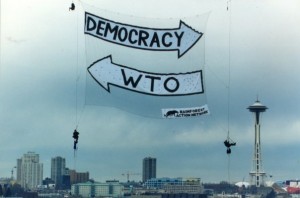| Introduction: Ten years after Seattle – Challenges for Global Social Movements Today

Foto: Dang Ngo
Close to the anniverary of the spectacular 30 November 1999 protest against the World Trade Organization in Seattle we received the manifesto by Franco “Bifo” Berardi, Italian activist and intellectual, “Ten years after Seattle. One strategy, better two, for the movement against war and capitalism“. Seattle was a welcome surprise for its militant, broad based protests and rebellion. Another treaty privileging the North failed; the movements suceeded in scandalizing the economic and social consequences of neoliberal globalization. Since then ‚Seattle’ stands in as a symbol of the powerful re-vitalization of global struggles against capitalist globalization.
Today – ten years later – Beradi positions himself radically against this narrative of success. Sure, he also regards ‚Seattle’ as a successful rebellion against the promises of neoliberalism. However, according to Berardi, social movements in general have not changed much about global capitalism, to the contrary, global wars and and militant fundamentalisms have proliferated.
| mehr »
